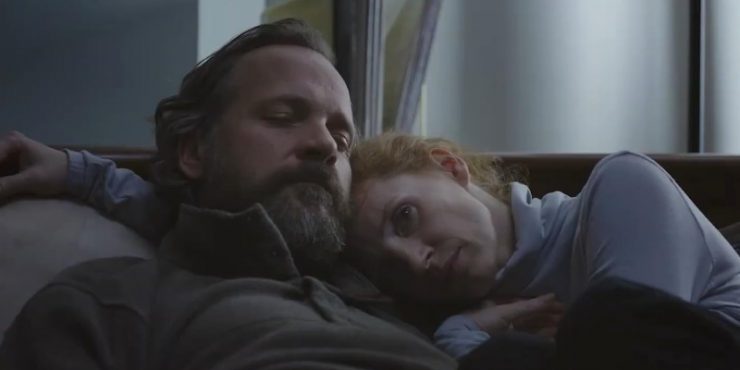On the surface, Michel Franco’s Memory seems to play notes that feel familiar to other trauma-based indie dramas. Our protagonist, Sylvia (played by Jessica Chastain), is a sexual assault survivor and recovering alcoholic. When she first meets Saul (Peter Sarsgaard), she’s convinced that he’s an unwanted presence from her past. When it’s revealed that he suffers from dementia, she agrees to be his part-time caretaker. This kind of meeting of damaged souls has been the bread and butter for many a harrowing film within American independent cinema since the 1990’s. Memory is Franco’s third English-language film. A native of Mexico, his interests lie mostly with the healing process than with the dirty details of trauma, which is how Memory‘s drama is allowed to flourish without feeling hackneyed.
The stardom of Jessica Chastain came so quickly and with such solidity that it’s almost hard to believe that she’s only been a major presence in Hollywood for twelve years. Winning the Oscar two years ago for The Eyes of Tammy Faye (a good-enough film that Chastain absolutely elevates) freed her from the burden of proving herself with an arbitrary award. Memory proves that Chastain is willing to take on projects of more complication, risking alienation and (that dreaded word) unlikeability. Her Sylvia is a fierce but delicate character, calloused by experience and easily triggered. Most of her relationships are within her AA group. She works at a day care center for disabled adults, which is enough to afford a small two bedroom apartment in Brooklyn, which she shares with her daughter Anna (Brooke Timber).
Outside of Anna, the only family she speaks with is her sister, Olivia (Merritt Weaver), a married mother of three who is frequently trying to convince Sylvia to re-enter the world and give Anna more freedom, but Sylvia’s conviction is intense; Anna will stay under her thumb for as long as possible. When she meets Saul at a high school reunion, his silent, affable demeanor triggers her and she walks straight home. Without a word, Saul follows her without a word. The next morning, seeing him drenched in rain water and in the freezing cold, Sylvia finally understands that Saul is not in full control of his faculties. She meets Saul’s brother, Isaac (Josh Charles), who explains that Saul is suffering from dementia – a surprise considering his age. Reluctantly, Sylvia agrees to help Isaac care for Saul, coming over during the day to make sure he doesn’t wander off yet again.
Where the plot turns is when Sylvia and Saul’s relationship becomes something deeper, and they find in each other the piece that makes them whole. It’s a clunky set-up that only works because the performances are so strong. Chastain pulls something off here that’s nearly impossible. Sylvia is both incredibly strong and impossibly fragile, but Chastain doesn’t play it as if they negate each other, instead giving us a woman who’s contradictions are her foundation. As Saul, Sarsgaard resists the urge to take an easy route and play up the usual ticks of dementia performances. There is no scared wanderings or panicked confusion. There is an absence of understanding or comprehension, but Sarsgaard mostly leans into a warmth of affection for the few things that are left to him, a choice that makes the movie twice as heartbreaking.
I quite enjoyed this film, even if I feel like Franco’s script sometimes smooths over the complications of its characters. There is a moment in the film’s opening thirty minutes where something very provocative is suggested but the film quickly scuttles it. A plot involving Sylvia’s mother (played by Jessica Harper) spills over into melodrama, and makes what had been a remarkably subtle film into something didactic. But the performances (aside from the two leads, Weaver, Timber, and Charles are all strikingly good) are across the board exquisite, and push this small indie from sorrow porn into a genuinely moving story about unexpected human connection.
Written and Directed by Michel Franco










